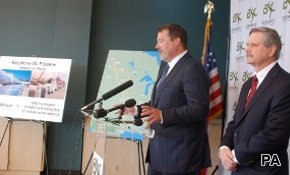(Week of 5/5/2012) Major Congressional action this week centered on negotiations in a conference committee with members from the Senate and House aiming to iron out differences in the versions of the transportation bill passed by each chamber. A key point of disagreement is the Keystone XL oil pipeline and a key motivation for agreement is the desire of Democrats and Republicans alike to pass the underlying highway bill.
Savvy Washington analyst William K. Moore of the Vianovo strategic consulting firm, writing at the outset of the week, noted that inexperience in this 112th Congress at convening such House-Senate conference committees might prove to be a stumbling block: “One problem with the transportation bill conference is that few members have experience ironing out the difference between the two chambers. Congress used to conduct about 75 conference committees a year. Tuesday's highway conference is only the 6th in 17 months.“
Maybe the failure of this Congress to employ more often the time-tested tool of conference committee compromise is a contributing factor explaining Congress’s current clownish 8% approval rating.
While the 112th Congress is the most polarized since Reconstruction, Mr. Moore says it is far from the worst. He awards that to the 36th Congress that convened in 1859. For its first two months, the 36th voted 119 times before electing a Speaker. A riot broke out during the debate when a pistol fell from one Representative's pocket, prompting all his colleagues to draw their own weapons. The 112th Congress has a long way to go to wrest the worst title from the 36th.
The conference committee negotiators, relatively inexperienced compared to conference committee conferees in previous Congresses, get a wary nudge in favor of pipeline construction from public opinion on how to handle the Keystone kerfuffle. Overall, 36% of adults nationwide favor pipeline construction and 15% oppose construction, but 31% favor construction only after a careful government review of its environmental impacts and 18% are not sure.
The issue pits strong Republican support (62% favor construction – 4% oppose) against weak Democratic opposition (17% favor construction – 24% oppose), and Independents leaning in favor of construction by 39%-15%. Similarly, conservatives strongly favor construction (71%-4%), while opposition from liberals is weak (14%-33%). The oldest Americans age 65 and older favor construction, 48%-9%, while the youngest under age 30 are opposed, 20%-22%. Support is strong in the West (42%-19%) and weak in the Northeast (29%-13%), with the Midwest and South in the middle. Men favor construction by 3-to-1 (44%-16%), women by 2-to-1 (28%-15%).
The slender straw to which pipeline opponents can cling would be based on making the case that “careful government review of its environmental impacts” has not yet occurred, in the hopes of winning the lion’s share of the wary 31% nationwide who support construction only after such review is complete.
Economist/YouGov poll archives can be found here
Photo source: Press Association









